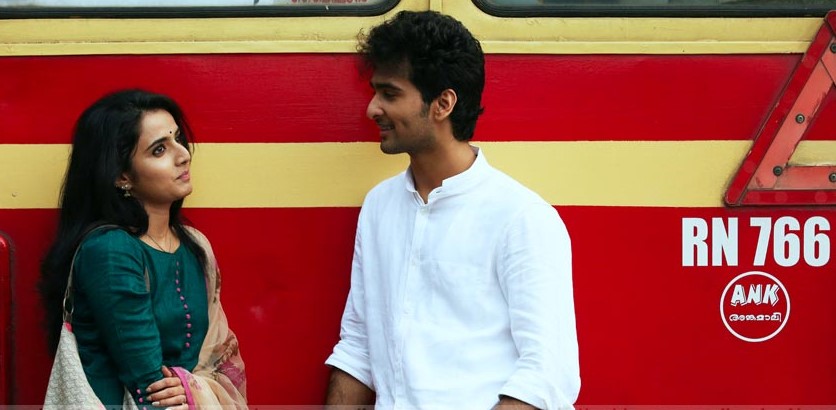
Moral policing is one social vice that often presents a bizarre oxymoron. The victim can easily turn the perpetrator and vice versa. The affected parties would not even realize as they themselves indulge in it – violently or subtly. Fresh off the Kiss of Love movement, Kerala is still plagued by anti-social elements who believe it is their responsibility to school the world on morality. Director Anuraj Manohar’s Ishq presents a curious case where a couple in their early twenties get entangled in an ugly duel with two vile men in an eventful night.
The film kicks off with a syrupy phone conversation between Sachi (Shane Nigam), a young office-going youth from Kochi and Vasudha (Ann Sheethal), a collegian from Kottayam. He is initially not listening to her with rapt attention but eventually does so as the conversation races towards their impending meeting on her birthday eve. Sachi borrows his friend’s red (symbolizing passion, perhaps) car and zooms off to meet his girlfriend. As the two begin their fateful journey, Sachi humorously labels it as Vasudha’s ‘first night’ to which she chides in response. All is well and good until the couple stops by a parking lot to exchange a few awkward pecks. One thing leads to another, they are caught in a humiliating situation where two strange men (Shine Tom Chacko and Jaffer Idukki) begin to intimidate them. The rest of Ishq is spent in how their actions affect Sachi and Vasudha – as individuals and as a couple.
First up, the film’s intents are noble and the issue is one that deserves a major motion picture. The immediate scenarios that the writer (Ratheesh Ravi) presents are highly believable. Ishq addresses how chastity is still considered a woman’s noblest virtue. Ditto for gender roles that are silently assigned by the society – man protects; women get hunted. At one point, Sachi feels the need to know a certain detail that Vasudha might be hiding. Sachi cites how he, as a man, deserves to know it. Vasudha, on the other hand, counter-questions stating how he wasn’t a man enough the night before. It is a crucial moment but not without a tiny background to it. In an early scene, we witness Sachi empathizing with a group of men who are out to avenge a man who had molested a friend’s sister. He casually adds, “Give a couple of punches on my behalf too,” Now this is a very typically manly (and borderline problematic) statement to make. Only if Ishq knew how it was silently and unknowingly contracting its core message.
The idea behind Ishq, to an average viewer’s understanding, is to expose toxic masculinity, which in turn percolates through layers to hypocrisy to give shape to what is labelled as moral policing. The chief antagonist, for instance, is not exactly a heinous villain. A family man with an acceptable vocation to boot, his criminal tendency emerges from deeply entrenched oppression. He considers intimidation as a tool to subjugate easy preys. The first half of Ishq, etched out in a series of grueling phases, is gripping, to say the least. One that starkly reminds us of the 2017 film S…Durga, the situations in Ishq, nevertheless, emerge from a more convincing network. The film throws on us a crackling interval point scene, only to go downhill and contradict its own message in the strangest ways possible.
In a age-old bid for the hero’s journey to find an accomplishment, the second half of Ishq completely sidelines Vasudha. It is indigestible how the film underestimates her strength. Yes, she is silent throughout the moments of intimidation, easily fearing a situation of social isolation. Still, Ishq forgets how she is a somewhat coy, young woman who doesn’t think twice before going on a long drive with her lover – which may not be a very acceptable or organic act for the social echelon that she belongs to. In absence of shades or notable agency, the twist in the tale attributed to her in the climax goes on to be a damp squib. It is as if Vasudha, at that moment, arose from a completely different film. Even if she were to convey the message that she does at the point of time, the devices would have been different and ditto for the style of delivery.
In terms of characterizations, Alwin’s (Chacko) part is the best etched. We feel the menace in his perceived normalcy, almost like Fahadh Fasil in Kumbalangi Nights. His wife (played by a fantastic Leona Lishoy) has her moments too, despite the entire extended sequence being somewhat problematic. The latter is the result of the tonal change which, many might argue, would be due to Sachi’s puzzling characterization. A gawky chap, despite his braces, is a poster boy of misogyny and toxic masculinity himself. In a smart scene staged at a restaurant, the film eerily establishes this very fact. Yet, it is a pity how Ishq fails to evaluate what to do with its people and their virulence. Instead, the film sort of empowers with him like some of those clichéd underdog victory narratives wherein the weakling derives strength (even physical) through unimaginable methods. At this instance, I couldn’t stop recalling 2018’s taut thriller Varathan which was going all fine until the writers stumbled upon the need to man-up its male protagonist.
ALSO READ: ‘S Durga’ review – about goddesses in a godless universe
Despite the film failing like nine pins from the third act onwards, it the ensemble cast that ties the premise like a tight drum. Shine Tom Chacko is extraordinary as he whisks through the understated deadliness of Alwin. Shane Nigam is first-rate as the youngster who finds himself on the crossroads of personal and moral conflicts. The family equation that the writer and director establish in the initial reels is warm and it also provides ample background to Sachi’s psyche. Newcomer Ann Sheethal gets limited scope but is photogenic and has a winsome screen presence. Jaffer Idukki successfully enacts what Alencier Ley Lopez would have aced in a similar film. However, his is another character that has been given a passive treatment and it becomes all the more baffling as the film approaches its penultimate reel.
Ishq, in entirety, adds up to be an occasionally thrilling yet weird film that breeds polar opposite intentions before and after the mid-point. The love story lacks in a much-needed volatility that one has seen in erstwhile Malayalam films such as Mayaanadhi and Anuraga Karikkin Vellam. For a timid couple who are awaiting everyman life destinations such as their impending marriage, the film’s sudden emotional transformation in the finale hits hard in our gut. So much so that we doubt if Vasudha is simply enacting a scene that she watched the night before in a certain Netflix sitcom whilst Sachi is stuck re-enacting an Indian telly thriller equivalent duly helped by a bizarre background score. Get the hint!
Rating: ★★★

